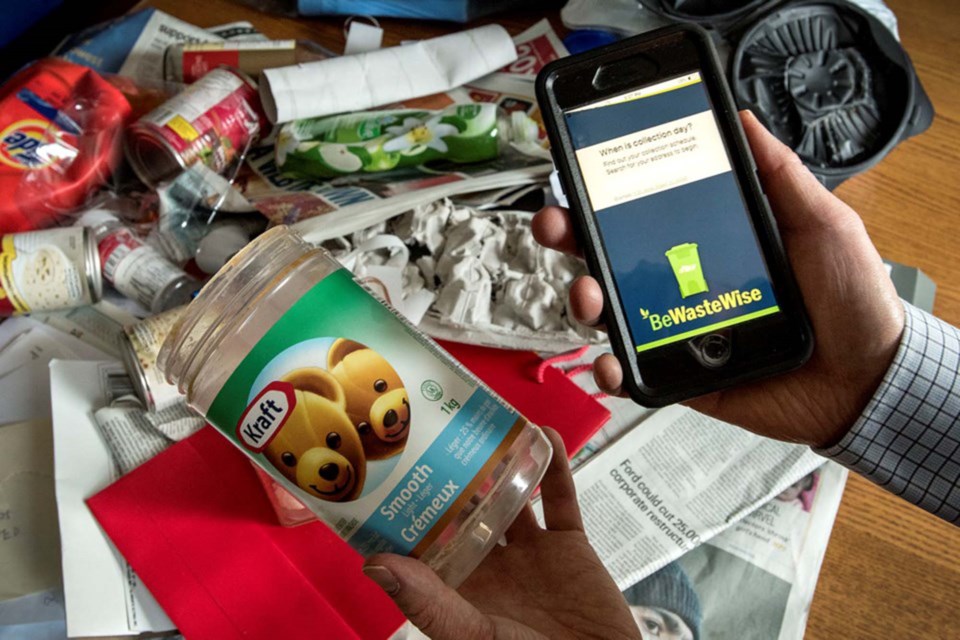Rates of City of St. Albert waste diverted from the dump dropped in 2021, and the decline was likely due to the pandemic, the city says.
In 2019, St. Albert’s average diversion rate sat at 63 per cent, falling in 2020 when it reached 58 per cent, and dropping even further this past year to 46 per cent overall, according to the city’s 2021 annual report.
Kerry Hilts, interim city manager for St. Albert, told council April 19 the city saw a decrease in the past year’s landfill diversion rates due to higher garbage generation.
“This was probably caused by residents staying home due to COVID, less leaf and yard organic waste due to a dry summer, and more organics unsuccessfully being diverted from the landfill due to being contaminated,” Hilts said.
Katie Burd, St. Albert’s waste and diversion operations supervisor, said in an interview that the city has been taking steps to address issues with organics contamination.
For example, the city conducted education and outreach in the last year-and-a-half specifically related to organics materials, including a “what goes where campaign” — a strategy the city took up with recycling in November 2018 after removing some items, such as spiral-wound cardboard and single-serve coffee cups from the recyclables list.
The recent organics campaign took place over 10 weeks, with each week highlighting a commonly mis-sorted item, such as to-go coffee cups and food packaging.
Burd said the city also went to Roseridge Waste Management — where the city’s organics garbage and organic material goes — between September 2020 and August 2021. There, staff conducted five separate week-long studies inspecting around 30 loads of organic material, and documented commonly mis-sorted items and geographic data about what neighbourhood the waste came from.
The best way for the public to find answers regarding what can be composted is the city’s Be Waste Wise App, Burd said, which includes education and resources about what goes where.
Pandemic stalled waste-diversion momentum: recycling expert
Christina Seidel, executive director of the Recycling Council of Alberta, said the pandemic interfered with prior progress the public had made in moving towards reusable items.
“We were just getting people trained to take their cups back into the coffee shop, and then COVID-19 happened,” Seidel said, noting this exacerbates both waste and litter.
Seidel also highlighted the influx of disposables directly related to COVID-19, such as masks and testing kits, on top of precautions encouraged at the beginning of the pandemic, including swapping reusable tote bags for disposable ones.
“These things are starting to recover a bit again, but people have gone back to more of a disposable lifestyle, unfortunately,” Seidel said.
Burd said the pandemic has “absolutely” set back recycling efforts due to businesses, grocery stores, and restaurants no longer accepting reusable bags, cups, or take-out containers.
Potter added that a rise in take-out dining also buoyed the amount of packaging generated.
During curbside waste education in 2021, Burd said city staff noticed issues with how retailers labelled their products. For example, takeout containers would say they were compostable, but in fine print would read “in municipal facilities.”
“What that means is that they are only compostable in indoor composting facilities such as Calgary’s, where temperatures can get really high, and they can process higher volumes,” Burd said.
The City of St. Albert uses a different method — outdoor windrows — for their compost, and is therefore unable to take these items.
“It’s definitely been very confusing, because the material says it’s compostable, but it’s not in our program,” Burd said.
The city is starting to develop a single-use item reduction strategy to reduce or eliminate single-use item waste, similar to strategies developed in Edmonton, Vancouver, and Toronto. Burd said St. Albert began exploring its own strategy in 2019, but met delays due to the pandemic, leading them to revisit the strategy now.
The city opened a public survey gathering feedback for the potential strategy from April 8 to May 8, with plans to release a report of the survey’s findings on May 31.
“Hopefully we will see those single-use items not being in our waste stream as much as before,” Burd said.
For the most part, Burd said St. Albert residents are doing a great job in keeping waste out of a landfill.
“We do really want to encourage our residents to continue using the green organics cart program … and continue to make our city the green botanical city it is,” Burd said.




